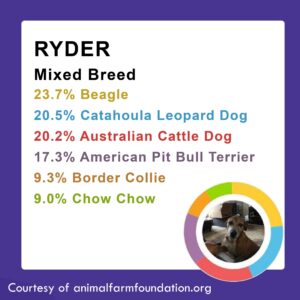New policy aims to give best possible outcome and chance of adoption for all shelter dogs
HARRISBURG, PA (March 1, 2024) – The Humane Society of Harrisburg Area (HSHA) is “removing the labels” from resident dogs. The organization will no longer be assigning breed labels to shelter dogs’ biographical information unless there is undisputed proof of lineage.
Research indicates that up to 75% of dogs are mislabeled when attempting to identify breed(s) through appearance, and that labeling on public-facing, biographical materials can negatively impact the length of stay and outcome for all dogs.


“There are certain behavior assumptions made based on breeds,” said Adam Lamb, Executive Director of Humane Society of Harrisburg Area. “Our reality is that we are working primarily with dogs that are mixed breeds who we really aren’t sure what their lineage is, and with that, their behaviors and personalities are each truly unique.”
The Humane Society of Harrisburg Area recognizes every dog as an individual with their own quirks, nuances, and preferences. HSHA is challenging staff and volunteers to get to know each dog as an individual and communicate to the public and potential adopters that looks do not equal behavior. Backed by research studies and shelter outcomes, operating without breed labels will be the new practice of the Humane Society of Harrisburg Area.
“As advocates, we must educate individuals that the way an animal looks is not a reliable indicator of their behavior,” Lamb said. “This will protect our dogs and our community.”
This new policy aligns with that of the Brandywine Valley SPCA, who HSHA recently entered into an affiliation agreement with, and has been working toward increasing adoptions and lifesaving work in the Harrisburg area.
About the Humane Society of Harrisburg Area
The Humane Society of Harrisburg Area is a nonprofit organization dedicated to building a better community for pets and people through compassion, protection, education, and collaboration. HSHA accepts homeless animals regardless of their breed, age, medical condition, or behavioral condition. However, HSHA does not euthanize adoptable animals due to lack of space or length of stay. The shelter assists thousands of animals each year through its residential care and adoption program, low-cost veterinary clinics and Veterinary Resource Center, pet food programs, and counseling services. Learn more at humanesocietyhbg.org.
###
Sources: National Canine Research Council, Animal Farm Foundation, Maddie’s Fund
